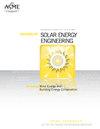A Scalable Compact Additively Manufactured Molten Salt to Supercritical Carbon Dioxide Heat Exchanger for Solar Thermal Application
IF 1.9
4区 工程技术
Q3 ENERGY & FUELS
Journal of Solar Energy Engineering-transactions of The Asme
Pub Date : 2023-08-02
DOI:10.1115/1.4063081
引用次数: 0
Abstract
Design of an additively manufactured molten salt (MS) to supercritical carbon dioxide (sCO2) primary heat exchanger (PHE) for solar thermal power generation is presented. The PHE is designed to handle temperatures up to 720 °C on the MS side and an internal pressure of 200 bar on the sCO2 side. In the core, MS flows through a three-dimensional periodic lattice network, while sCO2 flows within pin arrays. The design includes integrated sCO2 headers located within the MS flow, allowing for a counter flow design of the PHE. The sCO2 headers are configured to enable uniform flow distribution into each sCO2 plate while withstanding an internal pressure of 200 bar and minimizing obstruction to the flow of MS around it. The structural integrity of the design is verified on AM 316 stainless steel printed sub-scale specimens. An experimentally-validated, correlation-based sectional PHE core thermofluidic model is developed to study the impact of flow and geometrical parameters on the PHE performance, with varied parameters including the mass flow rate, surface roughness, and PHE dimensions. A process-based cost model is used to determine the impact of parameter variation on build cost. The model results show that a heat exchanger with a power density of 18.6 MW/m3 (including sCO2 header volume) and effectiveness of 0.88 can be achieved at a heat capacity rate ratio of 0.8. The impact of design and AM machine parameters on the cost of the PHE are assessed.一种可扩展的紧凑型添加剂制造的熔盐到超临界二氧化碳热交换器的太阳能热应用
介绍了一种用于太阳能热发电的超临界二氧化碳(sCO2)主热交换器(PHE)的添加制造熔盐(MS)的设计。PHE设计用于处理MS侧高达720°C的温度和sCO2侧200 bar的内部压力。在核心中,MS流过三维周期性晶格网络,而sCO2在pin阵列中流动。该设计包括位于MS流内的集成sCO2集管,允许PHE的逆流设计。sCO2集管的配置可使流量均匀分布到每个sCO2板中,同时承受200巴的内部压力,并最大限度地减少对周围MS流动的阻碍。AM 316不锈钢印刷亚标度试样验证了设计的结构完整性。开发了一个经过实验验证的、基于相关性的截面PHE核心热流体模型,以研究流量和几何参数对PHE性能的影响,其中各种参数包括质量流量、表面粗糙度和PHE尺寸。基于过程的成本模型用于确定参数变化对建造成本的影响。模型结果表明,在热容量比为0.8的情况下,可以实现功率密度为18.6MW/m3(包括sCO2集管体积)、有效性为0.88的换热器。评估了设计和AM机器参数对PHE成本的影响。
本文章由计算机程序翻译,如有差异,请以英文原文为准。
求助全文
约1分钟内获得全文
求助全文
来源期刊
CiteScore
5.00
自引率
26.10%
发文量
98
审稿时长
6.0 months
期刊介绍:
The Journal of Solar Energy Engineering - Including Wind Energy and Building Energy Conservation - publishes research papers that contain original work of permanent interest in all areas of solar energy and energy conservation, as well as discussions of policy and regulatory issues that affect renewable energy technologies and their implementation. Papers that do not include original work, but nonetheless present quality analysis or incremental improvements to past work may be published as Technical Briefs. Review papers are accepted but should be discussed with the Editor prior to submission. The Journal also publishes a section called Solar Scenery that features photographs or graphical displays of significant new installations or research facilities.

 求助内容:
求助内容: 应助结果提醒方式:
应助结果提醒方式:


